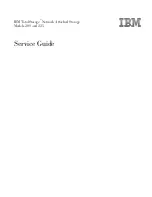
© Copyright IBM Corp. 2011
Chapter 7. Access Control Lists
89
VMap Example
In this example, EtherType 2 traffic from VLAN 3 server ports is mirrored to a
network monitor on port 4.
Using Storm Control Filters
The G8000 provides filters that can limit the number of the following packet types
transmitted by switch ports:
•
Broadcast packets
•
Multicast packets
•
Unknown unicast packets (destination lookup failure)
Broadcast Storms
Excessive transmission of broadcast or multicast traffic can result in a broadcast
storm. A broadcast storm can overwhelm your network with constant broadcast or
multicast traffic, and degrade network performance. Common symptoms of a
broadcast storm are slow network response times and network operations timing
out.
Unicast packets whose destination MAC address is not in the Forwarding Database
are
unknown unicasts
. When an unknown unicast is encountered, the switch
handles it like a broadcast packet and floods it to all other ports in the VLAN
(broadcast domain). A high rate of unknown unicast traffic can have the same
negative effects as a broadcast storm.
Configuring Storm Control
Configure broadcast filters on each port that requires broadcast storm control. Set a
threshold that defines the total number of broadcast packets transmitted
(0-2097151), in Megabits per second. When the threshold is reached, no more
packets of the specified type are transmitted.
To filter broadcast packets on a port, use the following commands:
To filter multicast packets on a port, use the following commands:
To filter unknown unicast packets on a port, use the following commands:
RS G8000(config)#
access-control vmap 21 packet-format ethernet
ethernet-type2
RS G8000(config)#
access-control vmap 21 mirror port 4
RS G8000(config)#
vlan 3
RS G8000(config-vlan)#
vmap 21 serverports
RS G8000(config)#
interface port 1
RS G8000(config-if)#
broadcast-threshold
<packet rate>
RS G8000(config-if)#
multicast-threshold
<packet rate>
RS G8000(config-if)#
dest-lookup-threshold
<packet rate>
RS G8000(config-if)#
exit
Summary of Contents for RackSwitch G8000
Page 1: ...RackSwitch G8000 Application Guide...
Page 2: ......
Page 3: ...RackSwitch G8000 Application Guide...
Page 16: ...16 RackSwitch G8000 Application Guide...
Page 22: ...20 RackSwitch G8000 Application Guide...
Page 23: ...Copyright IBM Corp 2011 21 Part 1 Getting Started...
Page 24: ...22 RackSwitch G8000 Application Guide...
Page 54: ...52 RackSwitch G8000 Application Guide...
Page 55: ...Copyright IBM Corp 2011 53 Part 2 Securing the Switch...
Page 56: ...54 RackSwitch G8000 Application Guide...
Page 92: ...90 RackSwitch G8000 Application Guide...
Page 94: ...92 RackSwitch G8000 Application Guide...
Page 144: ...142 RackSwitch G8000 Application Guide...
Page 145: ...Copyright IBM Corp 2011 143 Part 4 Advanced Switch ing Features...
Page 146: ...144 RackSwitch G8000 Application Guide...
Page 148: ...146 RackSwitch G8000 Application Guide...
Page 182: ...180 RackSwitch G8000 Application Guide...
Page 184: ...182 RackSwitch G8000 Application Guide...
Page 212: ...210 RackSwitch G8000 Application Guide...
Page 258: ...256 RackSwitch G8000 Application Guide...
Page 286: ...284 RackSwitch G8000 Application Guide...
Page 294: ...292 RackSwitch G8000 Application Guide...
Page 298: ...296 RackSwitch G8000 Application Guide...
Page 310: ...308 RackSwitch G8000 Application Guide...
Page 311: ...Copyright IBM Corp 2011 309 Part 7 Network Management...
Page 312: ...310 RackSwitch G8000 Application Guide...
Page 320: ...318 RackSwitch G8000 Application Guide...
Page 332: ...330 RackSwitch G8000 Application Guide...
Page 334: ...332 RackSwitch G8000 Application Guide...
Page 345: ...Copyright IBM Corp 2011 343 Part 9 Appendices...
Page 346: ...344 RackSwitch G8000 Application Guide...
Page 357: ...Copyright IBM Corp 2011 Appendix C Notices 355 Taiwan Class A compliance statement...
















































